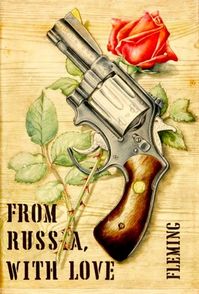James Bond & 7 Sins: What 'Russia with Love' reveals

Here is Dr. Pratt’s third column.
If you are counting Fleming’s 7 Deadlier Sins, I introduced the first two on Monday. Today, I’m introducing a third: Violence, which Fleming himself differentiated as dangerous temptations toward cruelty and malice.
Nearly all the James Bond adventure tales are peppered with violence, sadism, cruelty and malice. James Bond is described as a man with a cruel mouth whose demeanor is ruthless and cold. Ironically, Fleming was not promoting violence.
One of Fleming’s closest colleagues for more than 20 years reports that Fleming said often that people only have the right to kill what they will eat — and nothing more. But, the Bond tales expose the dangers of violence, cruelty and malice in the world through Fleming’s parables about evil people.
Violence, cruelty and malice coupled with romantic fantasies, seductions, and sex are the threads that form "From Russia with Love." Grounded in Cold War mythology, this tale moves upward into the cosmic struggle between good and evil, the forces of light against the forces of darkness.
Bond does not appear in the first third of this tale. Instead, we are introduced to the merciless, meticulous, malicious people plotting Bond’s death and ignominy. Why kill a man unless you can ruin his reputation also? The executioners of the plan are cold, indifferent, calculating agents of violence. Their plots are hatched near Hell’s furnace.
We all need to shine more light on this common temptation toward violence, because it so easily breeds fear, chaos, confusion and terror in our souls. There are forms of violence that are sanctioned by society, even revered as sacred. Who writes the history and on which side of the rampart one stands determine whether the violence of the moment is just or unjust, whether the actors are terrorists or freedom fighters.
Where do you see violence celebrated?
Where do you see a dangerous escalation of violence?
How do you think Fleming handled violence?
Originally published on OurValues.org.

